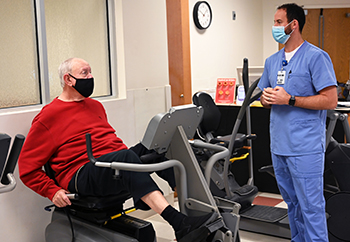
Picture of elderly gentleman working out on a seated bicycle while talking to his cardiac rehabilitation specialist.
Ask an AMH Expert: What is Cardiac Rehabilitation?
with Alissa Hunt, ACSM EP-C
If you've suffered a cardiac event and are looking to regain control of your heart health, our team is here to help. Through our 12-week outpatient cardiac rehabilitation program, we provide patients with an exercise prescription tailored to meet their own individual needs and limitations. Cardiac rehabilitation classes are held every Tuesday, Wednesday and Friday at 7 a.m., 9 a.m., 10:30 a.m. and 1 p.m.
What is cardiac rehab?
Cardiac rehab is an insurance-based program for individuals with qualifying cardiac events and diagnoses, to help patients manage and reduce their cardiovascular risk factors, regain/improve strength and stamina, and improve overall quality of life. Each individual participating in cardiac rehab will receive a rehab plan tailored to their individual needs and goals according to their personal functional status. The goal of cardiac rehab is ultimately to equip each patient with the necessary tools for living a heart-healthy lifestyle while reducing the likelihood of future adverse cardiac events as well. Each session, patients will have their heart rate, rhythm, blood pressure, and O2 saturation monitored by staff to ensure a safe response to exercise. This gives patients peace of mind knowing they can return to their daily activities with a better understanding of how their body responds to exertion and feel safe doing so.
Who qualifies for cardiac rehab?
Admissible diagnoses include:
• Heart attack (within the past 12 months)
• Coronary artery bypass graft surgery
• Stent placement
• Heart failure (ejection fraction must be 35% or lower)
• Heart or lung transplant
• Valve replacement
• Peripheral artery disease
Please stop by the rehabilitation department or call 336-846-0833 at any point if you are interested in cardiac rehab and would like to see if you or a loved one would qualify.
What if I’m out of shape?
Our cardiac rehab program is designed to be adapted to each participant’s specific needs. We meet you where you’re at functionally and have a wide variety of exercise modalities to accommodate any functional limitations you might have. Many of our patients have never exercised before and we design their program to gradually and carefully ease them into a regimen that they can tolerate.
Why can’t I just exercise at home?
By choosing to join our cardiac rehab program, you are guaranteed a safe environment where you will be monitored by trained staff as you exercise. Studies suggest that cardiac rehab can significantly reduce the risk of death following a cardiac event. Individuals who attend all 36 sessions have a 47% lower risk of death and a 31% lower risk of heart attack than those who only attend 1 session.
In cardiac rehab, your heart rate, heart rhythm, blood pressure, and blood oxygen will be closely monitored to ensure that your heart responds appropriately to exercise. If you choose not to do cardiac rehab and start exercising at home by yourself without knowing your limits, you are putting yourself at risk by not knowing how your heart and cardiovascular system will respond to any physical activity. That is why we encourage you to work your hardest while exercising in the safety of our cardiac rehab program, so that you will know your limits and feel comfortable being physically active on your own.
What are the benefits of cardiac rehab?
•
Improved Mortality Rates: Numerous studies have shown that completing cardiac rehab is associated with lower mortality rates among patients who have had cardiac interventions such as coronary artery bypass surgery (CABG) or percutaneous coronary intervention (PCI) compared to those who do not participate.
•
Reduced Hospital Readmissions: Cardiac rehab has been shown to reduce the likelihood of hospital readmissions for cardiovascular-related issues. Patients who complete the program are less likely to experience complications that require hospitalization, leading to potential cost savings for healthcare systems.
•
Improved Quality of Life: Participation in cardiac rehab is associated with a better quality of life. Patients who complete the program often report improved physical fitness, reduced symptoms such as chest pain, and enhanced psychological well-being compared to those who do not participate.
•
Enhanced Cardiovascular Fitness: Cardiac rehab programs include supervised exercise training, which helps patients improve their cardiovascular fitness. Studies have demonstrated that participants experience significant improvements in exercise capacity, endurance, and overall physical function.
•
Risk Factor Reduction: Cardiac rehab provides education on heart-healthy lifestyle changes, including diet, smoking cessation, and stress management. Patients who complete the program are more likely to adopt and maintain these positive changes, leading to better control of risk factors such as high blood pressure, cholesterol levels, and diabetes.
•
Psychological Benefits: Participation in cardiac rehab can have positive effects on mental health. Patients often report reduced anxiety and depression and increased confidence in managing their heart condition.
•
Medication Adherence: Research has shown that patients who complete cardiac rehab are more likely to adhere to prescribed medications, which is crucial for managing cardiovascular conditions effectively.
About Alissa Hunt, ACSM EP-C

Alissa Hunt is an eastern North Carolina native but moved to the High Country in 2023. She now lives in Jefferson with her husband, Adam. She and her husband enjoy being active in their church together, spending time with family and friends, and running, hiking, cycling, weight lifting, and snowboarding.
Education/Certification:
• North Carolina Wesleyan College
- Bachelor of Science in Exercise Science
• Certified through the American College of Sports Medicine as an Exercise Physiologist
Clinical Interests:
• EKG Interpretation
• Exercise Testing and Rehabilitation
• Maintenance Programs post-Cardiopulmonary Rehab
• Cardiovascular and Pulmonary Diseases




